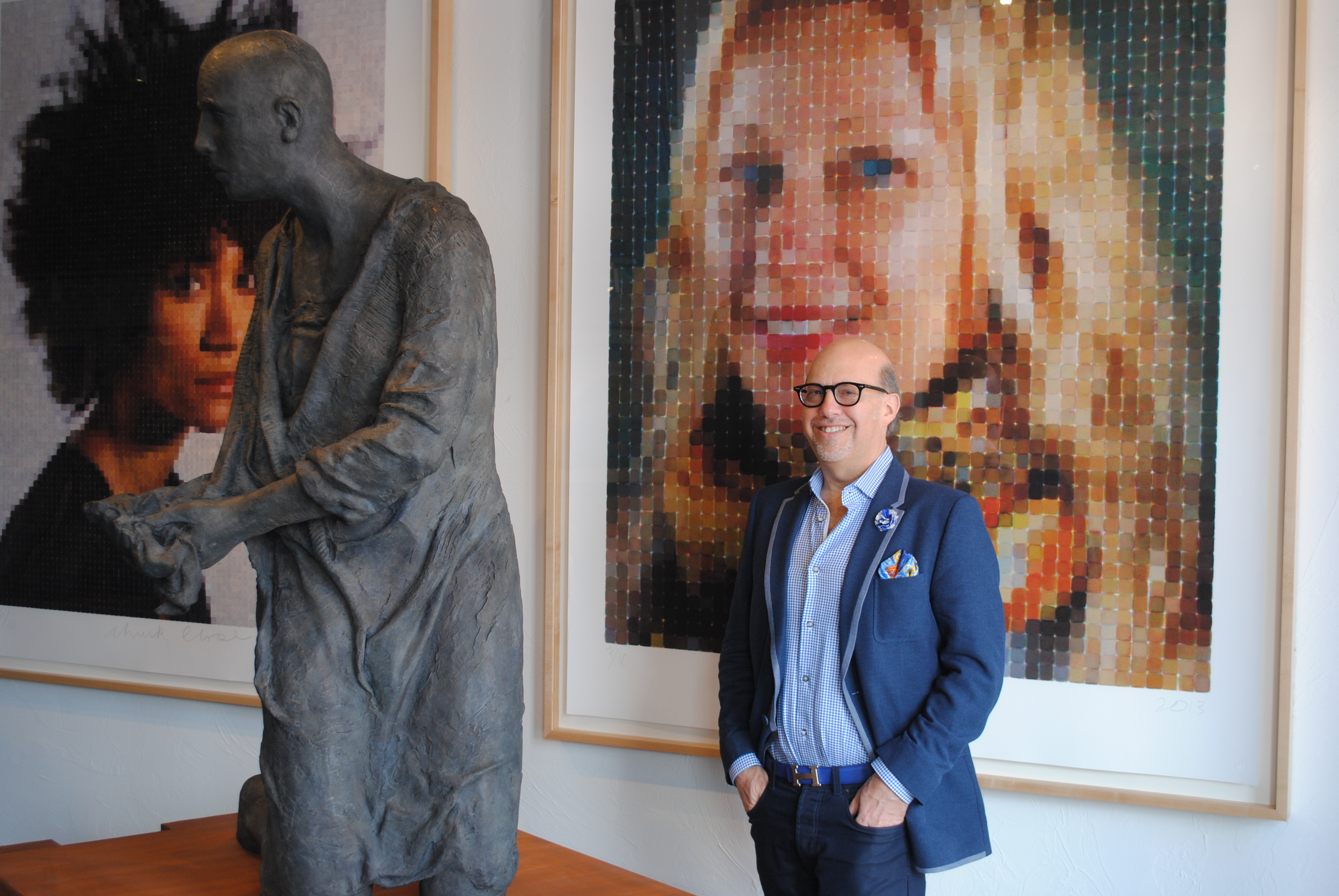By Carlo Wolff
The former manager and director of the Bop Stop since 2014, Gabriel Pollack hopes his experience helps make the Cleveland Museum of Art as top of mind for lovers of musical diversity as it is for lovers of the fine arts.
Imagine jazz concerts in museum galleries. Visualize lunching at the museum’s Provenance restaurant while a modern classical group performs.

Photo / Sharon Hughes
These are among the ideas Pollack is considering as he transitions from running a pristine listening room best known for jazz to director of performing arts at CMA, a role he assumed Oct. 17.
“I want someone looking for music in Cleveland to start considering the museum’s calendar,” Pollack says in an interview at the Bop Stop at The Music Settlement, the nationally recognized, 100-seat nonprofit venue in the Hingetown district of Ohio City that he ran for nearly eight years.
For now, Pollack is charged with overseeing performing arts at the museum and its branches, Transformer Station in Hingetown and the Community Arts Center on West 25th Street. He is responsible for MIX, a social and musical event in the CMA atrium the first Friday of each month; Solstice, the big CMA party every June; and City Stages, summer concerts of world music and dance outside Transformer Station.


Photo / CMA
“Gabe brings a unique combination of skills to his role at the CMA,” says his boss, Heather Lemonedes Brown, the museum’s deputy director and chief curator. “As an Oberlin-trained trumpeter, he’s got a deep appreciation for the arts. At the same time, he’s also developed entrepreneurial experience as the manager of the Bop Stop. His academic history, coupled with his practical experience, give him an understanding of both the art form and the business of managing the art form, which makes him perfectly suited to lead our performing arts program.”
Bop Stop benefits
Born in the Philadelphia suburb of Swarthmore, Pollack entered Oberlin College and Conservatory of Music in 2006, graduating with a bachelor’s degree in jazz entrepreneurship with a concentration in jazz trumpet performance. Instead of a senior recital, he wrote a business plan for a club
which he submitted to the Music Settlement as part of his job application.
Pollack’s first job out of Oberlin was with Jim Wadsworth Production Agency, helping to book and work with acts.
“That was a great intro to the music business,” Pollack says. “I’d spend my mornings working for Jim’s booking agency, and I was East Coast and Midwest agent for all of Jim’s acts and Steve Frumkin’s acts on the roster.”
He booked tours for groups like the Four Freshmen, Cyrille Aimée and Freddy Cole, and was schooled in negotiating dates and handling riders, or special stipulations, like a certain type of backstage food and beverage that an artist might demand.
At night, Pollack would go to the Cleveland Heights restaurant/nightclub Nighttown to run sound “and take care of the artist, get them fed, pick them up from the hotel, airport runs, all that sort of thing,” he says.
“All of that work translated directly to the Bop Stop. I would not have gotten the Bop Stop job without that experience,” he adds.
He was planning to return to the Philadelphia area when the Bop Stop job was posted, calling him to stay. When he got it, he bought a house in Cleveland’s Gordon Square Arts District. He and his partner will stay on the west side, he says.
Business to build on
At CMA, Pollack succeeds Tom Welsh, who left after 15 years to be managing director of Big Ears, a culture and arts organization in Knoxville, Tenn. Pollack heard about the CMA opening this summer during the National Independent Venue Association Conference in Cleveland, where the Bop Stop won the award for Best Innovation by a Club, Venue or Festival.
For Pollack, the move was natural – and overdue.
For the first year-and-a-half at the Bop Stop, he was a staff of one – running sound, manning the kitchen, tending bar and driving artists from airport to hotel.
“You start your days at 10, 10:30 in the morning, you’re here through a show, and yeah, it’s five or six 12-hour-plus days a week,” he says, noting the Music Settlement, his employer, gave him a free hand otherwise.
His job at CMA, which he accepted after rejecting another offer and dropping another promising lead, is more 9 to 5, and he has backup so he won’t have to cancel a show if he goes on vacation.
“I always felt pressure to push myself so our numbers would do well, but at the same time, balance my personal life. That was always a challenge for me,” Pollack says.

Not only did he rise to that challenge, Pollack brought the Bop Stop national attention by presenting some 300 concerts a year, developing innovative ventures like the “Live at the Bop Stop” radio program and podcast, and earning accolades like Best Jazz Club in America from readers of the online magazine All About Jazz in 2019. He notes jazz is the club’s signature but 20% of its offerings involve other kinds of improvisation-based music.
Pollack is particularly proud of Terence Blanchard’s Blue Note recording,
“Live,” a smoking album the prolific trumpeter-composer and his E-Collective band recorded at the Bop Stop over two nights in 2017.
He’s also pleased that outside of the state of Ohio-mandated COVID-19 lockdown in 2020, the club has remained open. In fact, from July 2020 to July 2021, the Bop Stop presented about 260 shows, almost as many as pre-COVID.
The pandemic actually spurred new business.
Student wannabes came seeking college auditions, rendered virtual by the lockdown. The Bop Stop, which acquired streaming equipment in 2020, ended up recording a lot of college audition tapes – effective ones. “I can’t take credit because the kids were talented, but the track record of students getting into their No. 1 or No. 2 schools with auditions that were recorded here is impressive,” Pollack says.
During that period, the Bop Stop also produced events for Cleveland-area firms like Moen and Fairport Wealth. “All these companies wanted to do virtual holiday parties,” Pollack says. “It would be crazy – we would have these rentals, there would be nobody here, but they were very lucrative nights.”
Such resilience attests to the spirit of collaboration Pollack aims to further in his new post.
“One thing that made the Bop Stop successful, especially on a small budget, was our partnered concerts,” he says. “I would love to be partnered with more community organizations to help bring their audiences to CMA.”
The museum wants to be more accessible to a greater number of people and present an even more diverse array of programs – not only musical but also, perhaps, theater and film – in more contexts, Pollack suggests.
Among the reasons CMA found him appealing was his knack for “balancing really artsy productions with some that are a little more mainstream, so that financially, everything evens out,” he says. He has balanced the books at the Bop Stop while creating a space known for “creative jazz improv music,” but that won’t say no to something mainstream.
“What’s appealing to me is that the museum has these goals, and they’re looking for me to create the road map on how to reach those goals,” he says.
Lemonedes Brown says, “Our performing arts program expands far beyond MIX, Solstice and City Stages. We have a regular repertoire of programs throughout the year spanning from chamber music to new wave artistry. These programs are an incredible way for us to engage with new and diverse audiences in a way that introduces those people to the CMA and helps us hear back from them.”

Photo / Cleveland Museum of Art
In good hands
Bryan Kennard, who is at least as credentialed as Pollack, is the new director of the Bop Stop. He spent part of August and most of September shadowing Pollack to learn the club’s ropes, saying he couldn’t imagine assuming the post without that crash course.

“I don’t think I would have really been able to run this club without that five-week grace period,” says Kennard, who officially started on Sept. 7.
Not only has Kennard, an accomplished flutist and composer, seen many concerts at the Bop Stop, he has performed there. A Cleveland native, he has master’s degrees in flute performance from Youngstown State University and in jazz composition from the University of Texas at Austin, and a Ph.D. in music technology from the University of Miami.
Kennard also cuts a figure similar to Pollack’s. Both are slim, lightly bearded and quietly charismatic. Kennard jokes that the resemblance was a job requirement.
Once Pollack nailed down the CMA job, he urged Kennard to go for the Bop Stop directorship. Kennard has a “great ear,” Pollack says. In addition, Kennard handled bookings professionally and he’s able to “work the lifestyle.”
“The Bop Stop has become the place for musicians to look to, an opportunity to explore their own musical ideas,” Kennard says. “And the venue is just set up so beautifully for that reason. It’s obviously a listening room when you walk in just because the attention is always on the stage.”
“I love the Bop Stop and I’ll miss it,” says Pollack. “But I felt like I was ready for the next step.”









